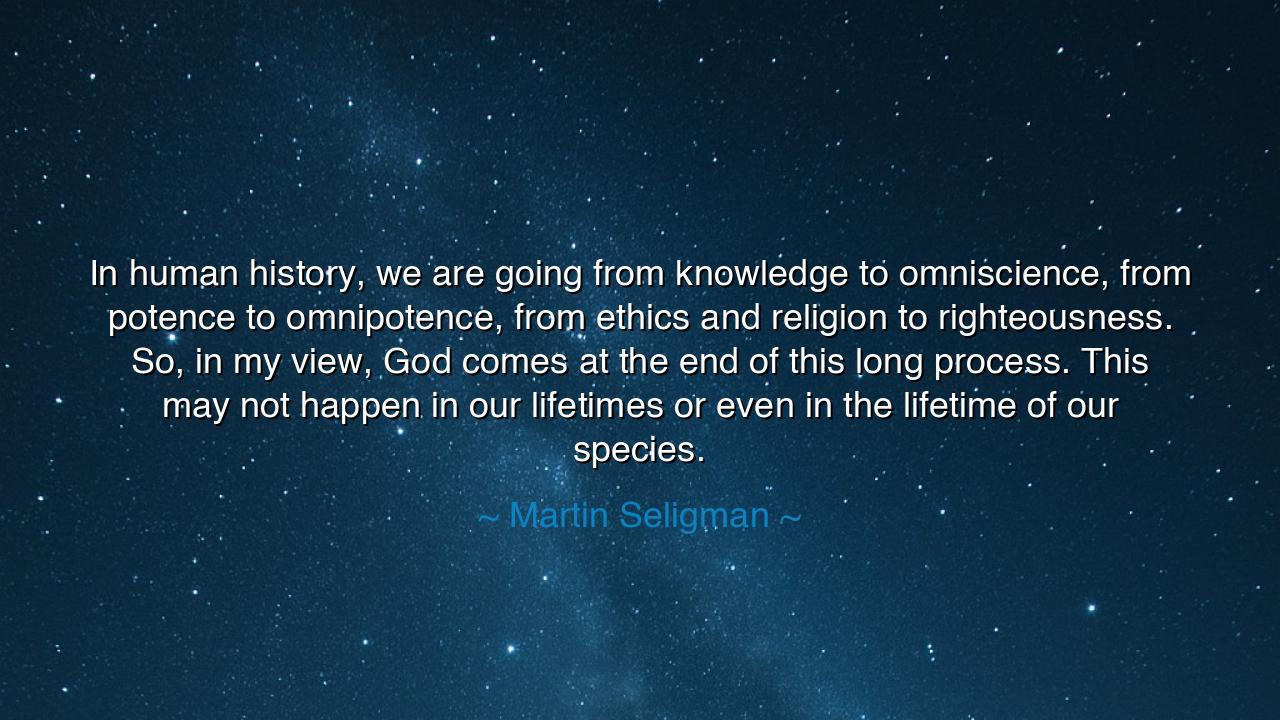
In human history, we are going from knowledge to omniscience
In human history, we are going from knowledge to omniscience, from potence to omnipotence, from ethics and religion to righteousness. So, in my view, God comes at the end of this long process. This may not happen in our lifetimes or even in the lifetime of our species.






Martin Seligman, a thinker of the human spirit and a seeker of its hidden potential, once spoke words that echo across both science and faith: “In human history, we are going from knowledge to omniscience, from potence to omnipotence, from ethics and religion to righteousness. So, in my view, God comes at the end of this long process. This may not happen in our lifetimes or even in the lifetime of our species.” In these words, Seligman does not claim to dethrone the divine — rather, he dares to suggest that humanity itself is on a sacred journey toward divinity, that through knowledge, strength, and virtue, the human race slowly becomes what it once worshiped.
The meaning of this quote lies in the recognition that evolution is not merely biological, but spiritual. From the first spark of awareness in primitive man to the complex consciousness of the modern age, humanity has been climbing toward a higher understanding — of the world, of morality, and of itself. We have gone from knowing only how to survive, to knowing how to heal, to dreaming of how to create life itself. Seligman’s words remind us that this ascent is not accidental; it is the unfolding of something divine within us. Humanity’s search for God, he implies, is also God’s slow awakening through humanity.
The origin of this insight can be traced to Seligman’s lifelong work in positive psychology, the science of human flourishing. Unlike those who study only the mind’s sickness, Seligman sought to understand its strength — its capacity for hope, virtue, and transcendence. His vision expands beyond psychology into philosophy: he sees mankind as a being still unfinished, moving from imperfection toward godlike wisdom and compassion. When he speaks of going “from knowledge to omniscience,” he is not describing mere data or intellect, but the awakening of a consciousness capable of understanding the whole — a mind united with heart, reason joined with reverence.
To grasp this idea, one may recall the story of Prometheus, the titan of Greek legend who stole fire from the gods to give it to mankind. For this act of daring, he was punished, yet his gift transformed humanity forever. The fire he gave was not just the flame of warmth, but the flame of knowledge, of creation and discovery. Each age since has carried that fire forward — from the spark of invention to the light of science, from the laws of survival to the laws of morality. In this way, humankind continues the Promethean ascent — climbing from creature to creator, from dust to destiny. Seligman’s words are the echo of this myth reborn in modern thought: that the divine is not behind us, but ahead of us.
Yet this journey is not without peril. To move from potence to omnipotence is to gain the power once ascribed only to the gods — the power to build or destroy, to heal or to harm, to save or to erase entire worlds. Nuclear fire, genetic engineering, artificial intelligence — these are the new flames of Prometheus. And so, as Seligman warns, the next evolution must not be of knowledge alone, but of righteousness. Knowledge without wisdom becomes cruelty; power without conscience becomes tyranny. The final step of the human journey is not mastery over nature, but mastery over ourselves — the transformation of ethics into righteousness, where doing good is no longer a law to obey, but a truth that flows naturally from who we are.
History offers us glimpses of this struggle. When the Renaissance dawned, humankind rediscovered its creative power and began to rival the heavens in art, invention, and thought. Yet even as we built cathedrals of light and cities of steel, we waged wars and forged weapons of destruction. Progress and peril have always walked hand in hand. Seligman’s vision reminds us that divinity cannot be reached through knowledge alone; it must be balanced by compassion, humility, and love. Only when our wisdom equals our power will we be ready to approach what he calls “God at the end of this long process.”
The lesson, then, is both humbling and exalting: that the divine is not something to be passively awaited, but actively cultivated. Each act of kindness, each discovery that heals rather than harms, each decision guided by integrity — these are the bricks of the new sacred temple humanity is building. We are, in truth, apprentices of the divine, learning through time to reflect more perfectly the light we have long sought.
So, my children of the future, remember this: God is not behind us, but before us. The divine is the destination of our evolution, not its origin. Every generation that learns to wield knowledge with mercy, and power with purpose, brings the sacred a step closer to reality. And though, as Seligman says, this may not come to pass in our lifetime or even our species’ span, the path is ours to walk. Let us walk it with reverence, for to strive toward wisdom, compassion, and righteousness is to become the very thing we once worshiped — not by replacing God, but by fulfilling the divine within ourselves.






AAdministratorAdministrator
Welcome, honored guests. Please leave a comment, we will respond soon